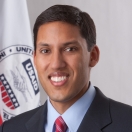
Ed. note: This is cross-posted on USAID Impact, the official blog of the U.S. Agency for International Development. See the original post here.
Eid Mubarak. As Muslims around the world celebrate Eid al-Fitr, we share our warmest and joyous wishes with them and their families. Earlier this month, we hosted our Agency’s 12th annual Iftar dinner. It was—as always—a welcome pause from our daily responsibilities and a reminder of the mission we serve. As President Obama said, Ramadan is a time for spiritual renewal and devotion—a chance to honor a faith known for its diversity and commitment to the dignity of all human beings.
We came together in reflection at a time when our mission—and our values—are being tested. Across the globe, millions of children, especially girls, face daunting threats. Syrian children continue to endure relentless dangers, from barrel bombs to extremist militias. Girls in India risk their lives simply by fetching water or visiting latrines. Children in Nigeria attend schools that are targets for terrorists rather than a sanctuary for learning.
Our work together is more critical than ever. Several years ago, we announced a new policy to put innovation and partnerships at the center of our work with women and girls around the world. To uphold that commitment, we recently launched Let Girls Learn, a powerful movement to call attention to the importance of investing in girls—in their education, in their health, in their potential.
Every day, we work to put the power of science and innovation into the hands of those who live their faith and serve this common purpose—a message I shared when I spoke at the National Prayer Breakfast earlier this year. Today, in Nigeria, we’re helping get half-a-million children, including 250,000 girls, into school and actually learning. In Jordan, we’re providing emergency education to 150,000 child refugees—including 60,000 girls—who have been forced to flee violence in Syria. And in Afghanistan, 3 million girls and 5 million boys are enrolled in school—compared to just 900,000 when the Taliban ruled by terror.
As we broke bread together at our Iftar, we were honored to hear from Parniyan Nazari, who spoke poignantly about her experiences growing up in Afghanistan under the Taliban. When girls were forbidden from attending school, she cut her hair like a boy. While they wanted to let her learn, the teachers told her that it could put everyone at risk. She used faded books from the International Rescue Committee to teach herself, and today, she is leading Women for Afghan Women working to provide education for girls and women.
Parniyan’s story of courage and compassion inspires us to draw strength from her example as we work to end extreme poverty in our lifetime. This Friday, our Agency is proud to host the first official event of the African Leaders Summit—one that brings together a diverse community to highlight the importance of faith organizations in development. Called Faith Works, it serves as another meaningful opportunity to celebrate the values that unite humanity and inspire us to reach towards extraordinary goals.
Check out more about USAID’s work with faith-based organizations.
Dr. Rajiv Shah serves as the 16th Administrator of USAID and leads the efforts of more than 9,600 professionals in 80 missions around the world.




